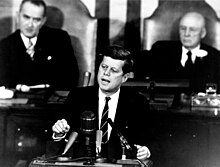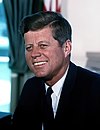We choose to go to the Moon
This article has an unclear citation style. (November 2013) |
 John F. Kennedy speaks at Rice University | |
| Date | September 12, 1962 |
|---|---|
| Duration | 18 minutes |
| Venue | Rice Stadium |
| Location | Rice University, Houston, Texas |
| Theme | The US Space effort |
| ||
|---|---|---|
|
35th President of the United States
Tenure
Appointments
Presidential campaign Assassination and legacy
|
||
The "Address at Rice University on the Nation's Space Effort", or better known simply as the "We choose to go to the moon" speech, was delivered by U.S. President John F. Kennedy in front of a large crowd gathered at Rice Stadium in Houston, Texas on September 12, 1962. It was one of Kennedy's earlier speeches meant to persuade the American people to support the national effort to land a man on the Moon and return him safely to the Earth.
Background

When John F. Kennedy became president in January 1961, Americans had the perception that the United States was losing the Space Race with the Soviet Union, which had successfully launched the first artificial satellite, Sputnik, almost four years earlier.[1] The perception deepened when in April 1961, Russian cosmonaut Yuri Gagarin became the first man in space before the US could launch its first Project Mercury astronaut. Convinced of the political need to make an achievement which would decisively demonstrate America's space superiority, and after consulting with NASA through his Vice President Lyndon Johnson to identify such an achievement, Kennedy stood before Congress on May 25, 1961, and proposed that “this nation should commit itself to achieving the goal, before this decade is out, of landing a man on the Moon and returning him safely to the Earth.”[2][3]
Kennedy's goal required the expansion of the National Aeronautics and Space Administration's Space Task Group into a Manned Spacecraft Center. Houston, Texas was chosen as the site, and the Humble Oil and Refining Company donated the land in 1961, through Rice University as an intermediary. Kennedy took advantage of the 1962 construction of the facility to deliver a speech on the nation's space effort.
The speech
See also
 Works related to We choose to go to the Moon at Wikisource
Works related to We choose to go to the Moon at WikisourceOn September 12, 1962, President Kennedy delivered his speech before a crowd of 35,000 people in the Rice football stadium. The most memorable and quoted portion of the speech comes in the middle:
We set sail on this new sea because there is new knowledge to be gained, and new rights to be won, and they must be won and used for the progress of all people. For space science, like nuclear science and all technology, has no conscience of its own. Whether it will become a force for good or ill depends on man, and only if the United States occupies a position of pre-eminence can we help decide whether this new ocean will be a sea of peace or a new terrifying theater of war. I do not say that we should or will go unprotected against the hostile misuse of space any more than we go unprotected against the hostile use of land or sea, but I do say that space can be explored and mastered without feeding the fires of war, without repeating the mistakes that man has made in extending his writ around this globe of ours.
There is no strife, no prejudice, no national conflict in outer space as yet. Its hazards are hostile to us all. Its conquest deserves the best of all mankind, and its opportunity for peaceful cooperation may never come again. But why, some say, the Moon? Why choose this as our goal? And they may well ask, why climb the highest mountain? Why, 35 years ago, fly the Atlantic? ...[4]
We choose to go to the Moon! ...[5] We choose to go to the Moon in this decade and do the other things,[6] not because they are easy, but because they are hard; because that goal will serve to organize and measure the best of our energies and skills, because that challenge is one that we are willing to accept, one we are unwilling to postpone, and one we intend to win ...[7]
Rhetoric
Kennedy's speech used three strategies: "a characterization of space as a beckoning frontier; an articulation of time that locates the endeavor within a historical moment of urgency and plausibility; and a final, cumulative strategy that invites audience members to live up to their pioneering heritage by going to the moon."[9]
Aftermath
Douglas Brinkley, a professor of history at Rice University, wrote in looking back on the speech on its 50th anniversary that:
Kennedy's oration was front-page news around the country. Pundits saw it as another Ted Sorenson-penned speech drenched in terrestrial aspiration. But for all of its soaring rhetoric, the Rice address was grounded in pragmatism. Kennedy made the case to taxpayers that NASA needed a $5.4 billion budget. Kennedy also did a tremendous job of connecting the moonshot to Houston in ways that thrilled locals. "We meet at a college noted for knowledge, in a city noted for progress, in a state noted for strength," he said. "And we stand in need of all three." What Kennedy did so brilliantly that day was frame the moonshot as being instrumental for U.S. security reasons.[10]
Notes
- ^ "1962-09-12 Rice University." John F. Kennedy Presidential Library & Museum. John F. Kennedy Presidential Library and Museum, n.d. Web. 23 Oct. 2013.
- ^ Howard E. McCurdy, et al. "Helpful Lessons From The Space Race." Issues In Science & Technology 27.4 (2011): 19-22. Academic Search Premier. Web. 23 Oct. 2013.
- ^ "Excerpt from the 'Special Message to the Congress on Urgent National Needs'" NASA. 24 May 2004. 24 May 2015. <https://www.nasa.gov/vision/space/features/jfk_speech_text.html#.VWIGJ0_tmkp>.
- ^ Here Kennedy inserts an inside football joke to the university audience: "Why does Rice play Texas?"
- ^ Kennedy pauses here for applause, and attempting to continue, repeats the clause "We choose to go to the Moon" several times over the continuing applause.
- ^ Here Kennedy is referring to auxiliary goals such as developing larger Saturn rockets and unmanned planetary exploration, mentioned earlier in the speech.
- ^ It is unclear why he ended this sentence with what sounds like an afterthought: "..., and the others, too."
- ^ "We choose to go to the moon." Wikisource. 7 Dec. 2011. 22 Oct. 2013. <https://en.wikisource.org/wiki/We_choose_to_go_to_the_moon>.
- ^ Jordan, John W. "Kennedy's Romantic Moon And Its Rhetorical Legacy For Space Exploration?" Rhetoric & Public Affairs 6.2 (2003): 209-231. Academic Search Premier. Web. 23 Oct. 2013.
- ^ Brinkley, Douglas. "50 Years Ago, Kennedy Reached for Stars in Historic Rice Address." Houston Chronicle. Houston Chronicle, 10 Sept. 2012. Web. 24 Oct. 2013.
References
- DeGroot, Gerard. "The Dark Side Of The Moon." History Today 57.3 (2007): 11-17. Academic Search Premier. Web. 23 Oct. 2013.
- Launius, Roger D. 2003. "Kennedy's Space Policy Reconsidered: A Post-Cold War Perspective." Air Power History 50, no. 4: 16-29. Academic Search Premier, EBSCOhost (accessed October 24, 2013)




